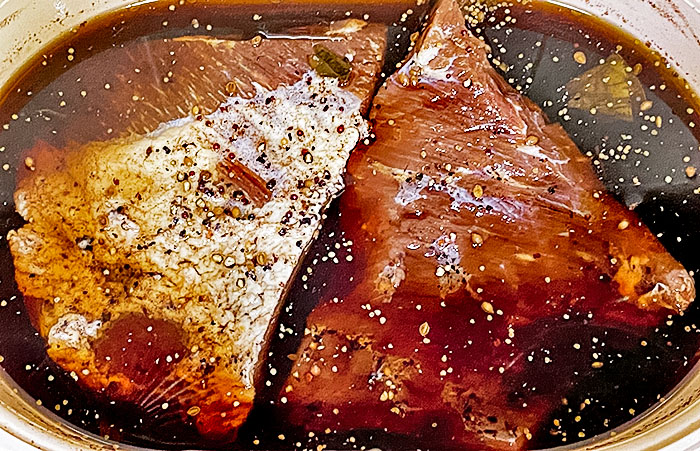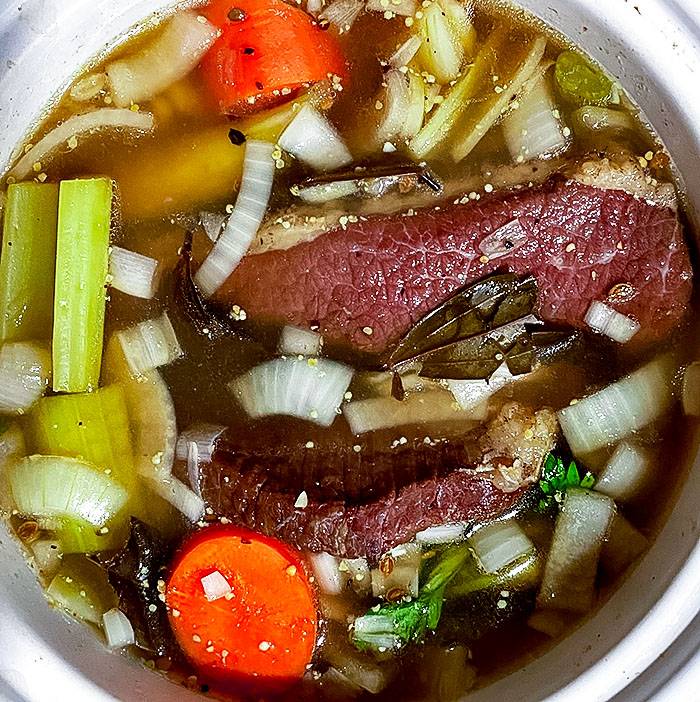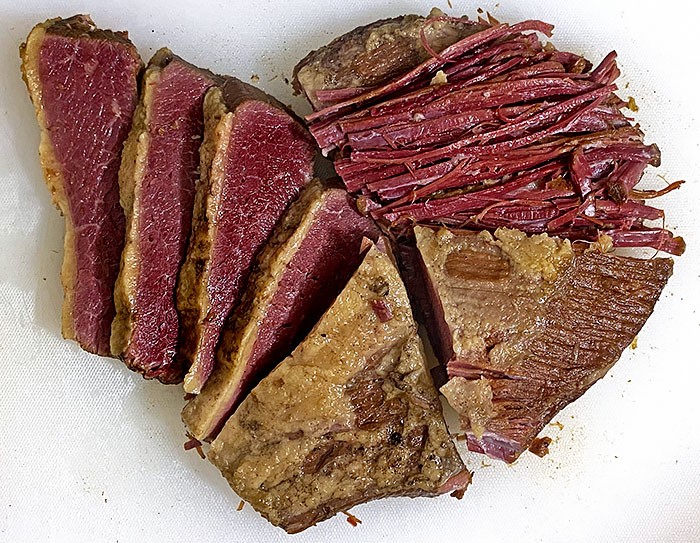|
Here I report on my first effort at homemade corned beef.
There is no corn
in the recipe. The word "corn" comes from the old English
meaning grain-sized (or pellets). Thus, many things can be corn
including maize (which eventually came to be known as just
"corn"). Cornstarch is also a misleading term as again, there is
no corn. Cornstarch is so named because grains such as wheat
were also called corn in old English. Cornstarch is just the
starch fraction of wheat flour. In the case of corned beef, it
is so called because large grains (corns) of salt were used to
brine the beef.
Method
Firstly, obtain
beef brisket of an amount suitable for your needs.
Prepare the brining solution
-
175 g table
salt
-
150 g brown sugar
-
25 g No. 1
Pink Curing Salt (Prague Powder)
This is pink in color so that it is not mistaken for table
salt (it is NOT Himalayan PINK salt).
It comprises 6.25% Sodium Nitrite and 93.75% table salt
(NaCl).
The nitrite is antimicrobial and helps preserve processed
foods. Red meat is red because oxygen binds with the pigment
myoglobin in meats. This binding is temporary and when the
oxygen is lost, meat turns grey. Nitrite is an alternate to
oxygen as a myoglobin binder but the bonds made are more
stable. This is why nitrited meats remain that ruddy color -
such as in corned beef when nitrite is added.
Be aware that nitrites when consumed has been shown to cause
cancer - in mice.
However, curing salt is used routinely in commercially processed meats
such as bacon, hams and corned beef. As with everything
else, eat these in moderation.
-
Spices (your
choice of blend and now much):
Roughly grind 2 tablespoons black peppercorns, 1 tablespoon
of mustard seeds yellow or black), and 1 tablespoon
coriander seeds.
Reserve a tablespoon of this blend for use in cooking later.
-
Add the sugar,
salt and ground spices into 1 litre of water.
-
Add 6 crushed
bay leaves, and 1 teaspoon of allspice powder.
-
Boil the mix
and then leave it to cool to room temperature.
Brining
-
Trim the beef
brisket to remove silverskin and excess fat.
-
Place the beef
into a suitably-sized container.
-
Add enough
cooled brining solution to completely immerse the beef.
-
Place in a
refrigerator and allow the beef to cure for at least 10
days.

The brisket flats
after 10 days in brining solution
Cooking
-
At the end of
the brining period, remove the beef and wash it to remove
brine.
You may choose at this time to immerse the beef in fresh
water to remove some of the salt which has entered the meat.
The amount of washing/soaking will depend on how salty you
prefer your corned beef.
Remember that the cooking process will remove more salt
later.
-
Immerse the
washed beef with fresh water in a saucepan.
-
Add a
mirepoix at this stage if you like and the reserved
ground spice blend.
A mirepoix is a trinity of sliced or diced aromatic
vegetables viz. carrot, onion and celery.
-
Bring the beef
to a gentle boil and cover the saucepan.
-
Adjust the
stove heat to allow a light simmer.

The corned beef
briskets being slow cooked with mirepoix and brining spices

After a slow simmer for 6 hours
|


